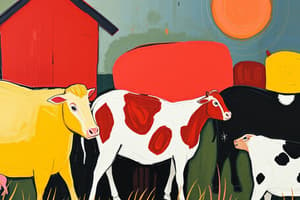Podcast
Questions and Answers
What takes place in Chapter 2 of Animal Farm?
What takes place in Chapter 2 of Animal Farm?
Snowball, Napoleon, and Squealer develop Major's ideas into 'Animalism', the Rebellion takes place, animals take over the farm, and the Seven Commandments are established. Napoleon takes away the milk.
Who is Snowball?
Who is Snowball?
He is vivacious, quick in speech, inventive, and one of the preeminent pigs who leads the development of Animalism.
Who is Napoleon and how is he different from Snowball?
Who is Napoleon and how is he different from Snowball?
Napoleon is fierce-looking, not much of a talker, and has a reputation for getting his own way. Unlike Snowball, he is more authoritarian and takes control of the food supply.
Who is Squealer?
Who is Squealer?
What more can you tell about Boxer and Clover?
What more can you tell about Boxer and Clover?
What more can you tell about Mollie?
What more can you tell about Mollie?
What is the theme regarding power in Chapter 2?
What is the theme regarding power in Chapter 2?
What does the theme of propaganda refer to in Chapter 2?
What does the theme of propaganda refer to in Chapter 2?
What does the theme of ruling by fear indicate?
What does the theme of ruling by fear indicate?
What is the connection between knowledge and power in the story?
What is the connection between knowledge and power in the story?
What style element is prevalent in Chapter 2?
What style element is prevalent in Chapter 2?
Flashcards are hidden until you start studying
Study Notes
Overview of Chapter 2
- Snowball, Napoleon, and Squealer develop the philosophy of "Animalism".
- The animals' Rebellion occurs almost accidentally, leading to their takeover of the farm.
- The Seven Commandments are established as the foundational laws of Animalism.
- Napoleon's action of taking the milk indicates early signs of corruption among the pigs.
Character: Snowball
- Described as "vivacious" and "quick in speech", Snowball demonstrates intelligence and creativity.
- Alongside Napoleon, he emerges as a primary leader after the Rebellion.
- Responsible for organizing the first meetings and promoting Animalism.
Character: Napoleon
- Characterized as "fierce-looking" and manipulative, contrasting with Snowball's charisma.
- Assumes a more authoritative role post-Rebellion, prioritizing control over resources like food.
- His methods suggest a growing inclination towards tyranny.
Character: Squealer
- Depicted as "small", "fat", and possessing a "shrill voice", Squealer is an adept propagandist.
- Gifted in persuasion, he can easily manipulate language to alter perceptions ("turn black into white").
- Plays a crucial role in communicating the pigs' decisions to the other animals.
Characters: Boxer and Clover
- Boxer and Clover epitomize loyalty to Animalism, showing unwavering dedication to its principles.
- They demonstrate blind faith, unable to critically assess the new regime, but lead engagement among other animals.
- Boxer’s act of sacrificing his hat symbolizes a deep commitment to the Rebellion's ideals.
Character: Mollie
- Portrayed as vain and superficial, Mollie is solely interested in material comforts like sugar and ribbons.
- Her lack of understanding of the Revolution highlights her self-centeredness, ultimately leading her to abandon the farm.
Theme: Power Corrupts
- Napoleon’s usurpation of resources like milk symbolizes the initial corruption of power dynamics.
- Pigs quickly position themselves as leaders, foreshadowing their future authoritarian rule.
- Early behaviors hint at growing inequality among the animals and the emergence of a ruling class.
Theme: Propaganda
- The Seven Commandments serve as easily memorable principles aimed at indoctrinating the less intelligent animals.
- Simplification of ideology reflects an effort to control and persuade the population.
Theme: Ruling by Fear
- There is a consistent focus on the fear of Man, exemplified by Squealer's threats of a return to human oppression.
- Animals are coerced into compliance through the specter of their past suffering under Mr. Jones.
Theme: Literacy
- Knowledge is portrayed as a form of power; the pigs' literacy enables them to manipulate other animals easily.
- Awareness of reading and writing gives the pigs a strategic advantage, complicating the dynamics of power on the farm.
Style: Irony
- The initial destruction of symbols of oppression, like harnesses and ribbons, turns ironic as pigs later adopt similar behaviors and traditions.
- The commandments meant to represent equality become tools of oppression as the pigs begin altering them for personal gain.
- The animals’ rejection of alcohol contrasts their eventual embrace of it, showcasing ironic shifts in values over time.
Studying That Suits You
Use AI to generate personalized quizzes and flashcards to suit your learning preferences.




